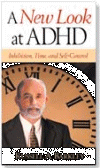
 |
|||||||||||||||||||||||||
 |
|||||||||||||||||||||||||

ISBN# 1-57230-497-9
Publication Date: 2000
Format: 1 Color VHS
(approx. 30 minutes)
+ 40-page Manual
Summary
This video provides an accessible introduction to Russell A. Barkley's influential theory of the nature and causes of ADHD. The program brings to life the conceptual framework delineated in Dr. Barkley's book ADHD and the Nature of Self-Control. Dr. Barkley shares his breakthrough thinking about the roots of many of the most troubling--and perplexing--ADHD symptoms in children and adults. Also shown are concrete ways that our new understanding of the disorder might facilitate more effective clinical interventions. This lucid, state-of-the-art program is ideal viewing for clinicians, students and inservice trainees, parents of children with ADHD, and adults with the disorder.
WHY A NEW THEORY OF ADHD?
As many as three million American children and more than twice as many adults have ADHD today. The video shows that the traditional understanding of ADHD as a disorder of attention fails to explain many of the problems these individuals encounter in school functioning, peer and family relationships, occupational success, and daily living. Demonstrating the need for a new theory of ADHD, Dr. Barkley proposes that it is fundamentally a disorder of self-regulation, not attention. Viewers see how the new theory better accounts for such symptoms as:
PRACTICAL IMPACT OF THE THEORY
Of crucial importance, the video explores how greater insight into the nature of ADHD might improve client and family education and symptom management. Everyday implications of the theory are discussed, and viewers learn tangible ways that children and adults with ADHD may be helped to succeed in tasks and settings that are difficult for them.
Manual & Leader's Guide
Reviewing and amplifying key ideas discussed in the video, the companion manual serves as a handy guide to Dr. Barkley's theory of ADHD. It contains illustrative figures as well as helpful suggestions for further reading. Also included is a leader's guide providing tips on the optimal use of the video in a range of settings and with a variety of audiences.
Reviews
"This video is highly informative, scientific, and professional, and will have an important and positive impact. Dr. Barkley has a tremendous ability to provide very rich information in a short period of time. He communicates difficult concepts in a way that enables people from various backgrounds to understand the main points of his theory. The video will be useful in a wide variety of settings. I will show the video in my office (to parents of newly diagnosed children and to adults with ADHD), in CHADD meetings and parent support groups, and in inservice teacher training. It also will serve as an excellent educational tool for mental health professionals, physicians, nurses, and graduate students. This program will aid in the development of more consistent and scientifically based protocols to diagnose and treat ADHD. Its coverage of interventions is extremely valuable and hopeful, and includes a good sampling of interventions in the school setting."
-Vera Joffe, PhD
"With his usual brilliance, Dr. Barkley presents his latest framework for understanding ADHD. Because these concepts are often complicated to follow in print, this polished and well-produced video is an excellent educational tool, especially for those of us who are somewhat theory-impaired."
-Michael Gordon, PhD
"Barkley is one of the leading investigators, clinicians and thinkers on ADHD. In this video, he attempts to clarify the underlying psychopathological basis of ADHD. He does this in a clear, interesting, and thoughtful manner. The video may lead to improved concepts of diagnosis and management, especially in educational settings. Our clinic found this video interesting, stimulating, and thought provoking, and we recommend it highly to others."
-John S. Werry, MD
"What is most exciting about this new approach is the deeper understanding of the nature of ADHD that it provides. From this new level of understanding, we can derive principles that can facilitate the search for effective interventions. These principles also help explain why many existing treatments work well, while some others do not."
-Dr. Barkley, from the video

